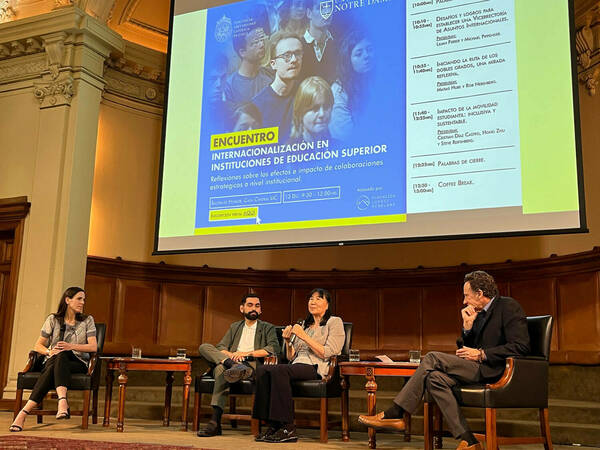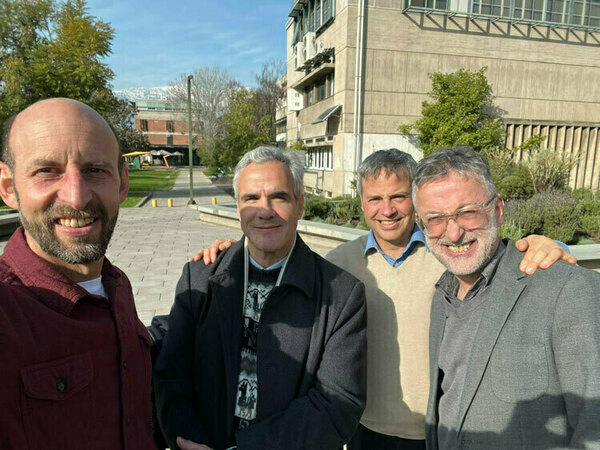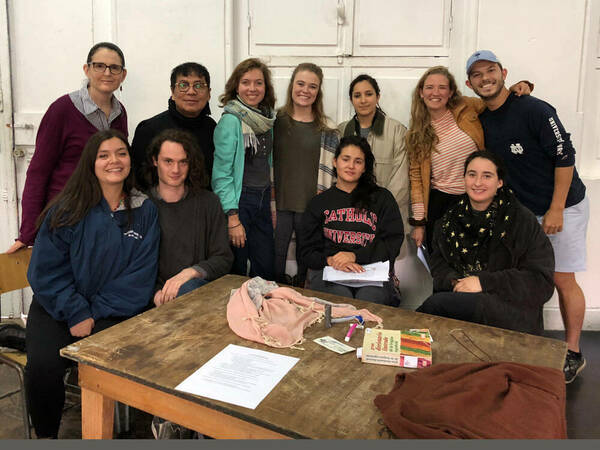Ten Years of Success with Luksic Scholars Foundation Grants: A testimony to the multiplying effects of collaboration

When Chilean benefactor Andrónico Luksic and the Luksic Scholars Foundation began a partnership with Notre Dame in 2013, the critical seed of that partnership was a belief in the vast benefits—indeed, the multiplying effects—of an investment in human interaction.
Not investment in buildings, not in laboratories, but in human interaction.
The Luksic family’s model was one that they had implemented successfully for years, as they dedicated themselves to connecting Chile with people, businesses, and institutions around the world. From their experience, they knew: powerful things happen from small-scale relationship building.
In Notre Dame’s case, both the relationship building and the powerful results occurred through a cluster of grants funded by the Luksik Scholars Foundation—in total, more than 170 collaborative research grants. Since 2013, those grants have paired Notre Dame faculty, students, and administrators with their counterparts at the Pontificia Universidad Católica de Chile (UC Chile) in Santiago—and vice versa under originally separate and then joint administration by Notre Dame Global and UC Chile.
“This collaboration has fostered a virtuous connection in a sphere with great transformative potential in society: higher education,” says Isabella Luksic, executive director of the Luksic Scholars Foundation.
“Throughout these years, we have seen how the strategic collaboration between these institutions has positively transformed the educational and professional trajectories of hundreds of people. But we have also been able to observe how the collaboration has promoted knowledge, research, and cultural exchange between the two countries.”
A Look Back, A Look Forward
In December 2023, representatives of the Luksic Scholars Foundation, Notre Dame, and UC Chile, along with many Luksic Scholars and other interested participants, gathered at a two-day conference in Santiago to look back at their decade of partnership and to explore in both general and specific ways the opportunities and challenges of international research and collaboration.

In addition to the Luksic Scholars Foundation team, a key participant was UC Chile’s president Dr. Ignacio Sánchez, who, like the Luksic family, has long been an internationalist with a vision of engaging leading global universities with their Chilean counterparts. He received an honorary degree from Notre Dame in 2019.
For his part, President Sánchez stressed the importance of promoting internationalization in higher education: “As a university, we are committed to continuing to establish strong relationships with universities and research centers around the world. This program marked the beginning of a very fruitful collaboration that has benefited academics, administrators, and in particular, our students. We believe that we need to foster global skills for global challenges, and internationalization opens opportunities in that path.”
Another key participant was Lillian Ferrer, vice rector for international affairs at UC Chile. She said: “Our challenge has revolved around imprinting the mark of internationalization across our university efforts, spanning research, teaching, and public engagement. Throughout this pursuit, the partnerships with our strategic allies have proven remarkably beneficial. I want to underscore the significance of collaboration between foundations and academia. It plays a crucial role in training and attracting talent that generates the necessary knowledge to address the challenges we face as a society.”
In addition to Michael Pippenger, vice president and associate provost of internationalization, Hong Zhu, senior director of global education, and Notre Dame Santiago director Juan Esteban Montes from Notre Dame Global, two Notre Dame faculty members who played key roles in the decade-long partnership attended the December conference.
One was Robert Nerenberg, professor of civil and environmental engineering and earth sciences, who, in addition to his collaborative research on biofilms (as detailed below), forged a dual degree program in engineering with Notre Dame and UC Chile in 2011.
The other was Steve Reifenberg, teaching professor of international development in the Keough School of Global Affairs (and, in Spring 2024, serving as a Fulbright US Scholar in Santiago), who was instrumental in first connecting the Luksic family to Notre Dame.
On the first day of the conference, Reifenberg shared how he had initially encountered the Luksic family and their internationalist vision during his previous roles at Harvard University.
“Theirs was a model that promoted incredible opportunities for relationship building—collaboration, partnerships, and friendships,” he said.
When Reifenberg arrived at Notre Dame in 2010, he saw the opportunity for a unique partnership between two Catholic universities—Notre Dame and UC Chile—and their shared missions of being a force for good in the world.
“With Notre Dame Santiago a longstanding location for Notre Dame study abroad programs and faculty immersion under the directorship of Esteban Montes and his team,” Reifenberg explained, “the mechanisms were already in place to take collaborations and partnerships to an all-new level.”
Thus, built on strong relationships, and then activated and propelled by the generosity of the Luksic family, the first ND-PUC collaborative grants were launched in 2013.
“Luksic grants have enabled Notre Dame faculty, administrators, and students to develop a familiarity, respect, and expertise in partnering and collaborating with Chileans and Chilean institutions."
An impressive record of collaborative scholarship
The 176 collaborative partnerships over this past decade have been grounded in such diverse fields as engineering, medicine, mathematics, arts, the social sciences, and the humanities. Just a few representative examples:
- research on biofilms, with applications for advances environmentally and in combating resistance to antibiotics;
- methods of improving structural resistance during earthquakes;
- examination of the works of Chilean women playwrights and their social impact;
- the design of better imaging tools for the diagnosis and treatment of cardiovascular disease;
- an investigation of art exploring the contours of Chilean society during and after the Pinochet dictatorship;
- the effects on children of social stratification and integration in schools;
- a better design of pension systems and the associated regulation of financial advisory firms.
Next, two exemplars of how small-scale collaborations can have an extraordinary multiplying effect.
Robert Nerenberg: Biofilms and their applications environmentally and medically

Professor Nerenberg and his research group focus on biofilms, which are naturally forming aggregates of bacteria embedded in a self-produced gel layer.
“Biofilms are the dominant form of microbial growth in most environments,” Nerenberg explains. “In environmental engineering, they may play beneficial roles, such as acting as biocatalysts in waste treatment processes. They also may play detrimental roles, such as fouling water filtration membranes. In the sphere of medicine, when bacteria form a biofilm infection in the human body, they are extremely resistant to antibiotics—requiring increasingly harsh therapies.”
In a perfect example of the multiplying effect that is the hallmark of Luksic Scholars grants, Nerenberg first developed techniques to study the biofilm extracellular matrix under a Luksic Scholars grant in 2018. He then worked with fellow Notre Dame engineer Albert Cerrone and partners at UC Chile under a second Luksic grant in 2020 to combine antibiotics with low-frequency ultrasound to greatly enhance the effectiveness of some antibiotics.
An exciting further step—the multiplying step–was combining forces with microbiologists at Trinity College Dublin to research a novel method to treat the resistance to antibiotics that often plague those with a diagnosis of cystic fibrosis, of which there is a high incidence among children in Ireland.
“We are hopeful about the potential to transform lives by this therapy,” says Nerenberg, “and the foundation of that hope lies with initial funding from the Luksic Scholars Foundation and the collaborative research that is so critical to advances in science.”
Anne Garcia-Romero and collaborators from UC Chile study contemporary Chilean female playwrights
For Garcia-Romero, the beginning of the multiplying effect of Luksic Scholars funding was the fall of 2018. She and her Notre Dame colleague Anton Juan, received a Luksic grant to teach in UC Chile’s School of Theater.
“Our course was a remarkable collaboration between the Notre Dame and Chilean students,” she recalls, “and an extraordinary exchange of methodologies, ideas, ways of working, and knowledge in the discipline of theatre. It gave us a new appreciation and a deeper understanding of the legacy of Chilean theatre.”

During that time, Garcia-Romero attended a conference at UC Chile on Chilean women playwrights.
“On the spot, I began a research group with UC Chile colleagues, which led to two of its faculty members, Dr. Inés Stranger and Dr. Coca Duarte, visiting Notre Dame in Fall 2019 to teach and interact with Notre Dame students and faculty, and then a third UC Chile faculty member, Dr. Maureen Boys, visiting in Fall 2022—all three supported by collaborative Luksic grants.
Garcia-Romero is now co-author with Drs. Stranger and Duarte of a volume titled Dramaturgas Chilenas: Chilean Female Playwrights in the Early 21st Century. It features English translations of plays by five of Chile’s leading female playwrights and explores the question: How do female Chilean playwrights address historical trauma, gender justice, and collective memory in post-dictatorship, democratic Chile?
“Luksic Collaborative grants—and the relationships they made possible and nurtured, says Garcia-Romero, “are the foundation of this book. There was most certainly a multiplying effect from that very first grant in 2018.”
The collaborative path forward
At the December conference, Pippenger thanked the many key members of the partnership between the Luksic Scholars Foundation, Notre Dame, and UC Chile. On behalf of Notre Dame, he particularly noted the work of two Notre Dame Global administrators. First, Dr. Geraldine Meehan, Notre Dame Global’s director of faculty engagement, who has been the hands-on bridge between Notre Dame and UC Chile from the start of the collaborative grants. Second, Notre Dame Santiago director Esteban Montes, who has played a strong “ambassadorial” role in the Luksic Scholars Foundation grants by his encouragement, his gift of making connections between faculty researchers, and the important administrative support he and his team have provided throughout the ten years of the grants.
Then, reflecting on the history and record of this inspiring partnership over the last decade, Pippenger said:
“Luksic grants have enabled Notre Dame faculty, administrators, and students to develop a familiarity, respect, and expertise in partnering and collaborating with Chileans and Chilean institutions. Through that valuable work, we have narrowed the geographic distance between the U.S. and Chile—demonstrating an overall commitment to making a social impact that provides transformational change within Chile and the U.S. That has also made future collaborations on common societal challenges realistic, possible, and exciting.”
See the press release by the Luksic Scholars Foundation.
Originally published by at global.nd.edu on May 30, 2024.
Latest Research
- U.S. states impact foreign policy amid national China unease, research showsState-level officials such as governors, state legislators, and attorneys general are shaping U.S.-China relations as the two countries navigate a strained geopolitical relationship, according to new research by political scientist Kyle…
- CI Compass leads archiving, long-term data preservation conversation at 2024 NSF Research Infrastructure WorkshopAs scientific data at U.S. National Science Foundation (NSF)-funded mid-scale and major facilities continues to grow exponentially with the help of advanced instrumentation and increased computing power, the challenge of preserving, archiving, and keeping that data accessible grows with it. In March,…
- Thirty-four students and alumni awarded Fulbright grantsNearly three dozen University of Notre Dame students have been named finalists, and another eight alternates, for the 2024-25 Fulbright U.S. Student Program. The finalists include 26 undergraduate students and eight graduate students.
- Colin Barr appointed next Thomas Moore and Judy Livingston Director of the Keough-Naughton Institute for Irish Studies.Colin Barr has been appointed the next Thomas Moore and Judy Livingston Director of the Keough-Naughton Institute for Irish Studies, effective January 1, 2025. A distinguished historian…
- Notre Dame political and computer scientists probe authoritarian regimes’ use of social media to attack democracy“Authoritarian regimes — like Russia, China, and Iran — are actively using social media platforms to spread misinformation, and this has real-world impacts,” said Karrie Koesel, associate professor of political science at the University of Notre Dame. “To protect democracy at home and abroad, we must understand the different ways it is being attacked.”
- Seeking evidence-based policy, economist investigates how anemia impacts education for adolescents in IndiaIn low- and middle-income countries, anemia reduction efforts are often touted as a way to improve educational outcomes and reduce poverty. A new study, co-authored by a Notre Dame global health economics expert, evaluates the relationship between anemia and school attendance in India, debunking earlier research that could have misguided policy interventions.












